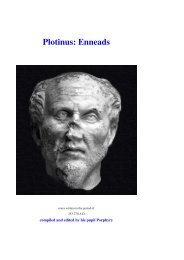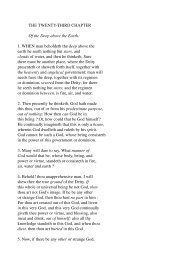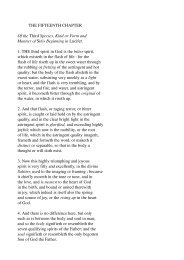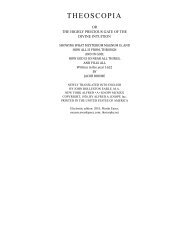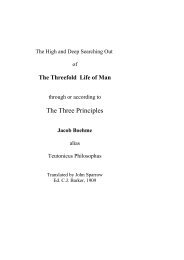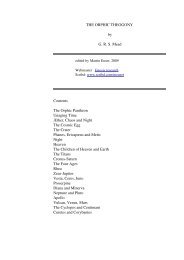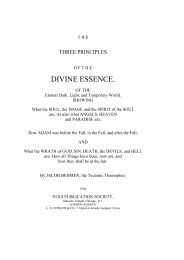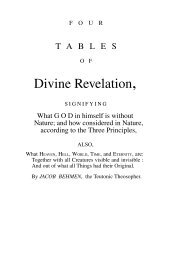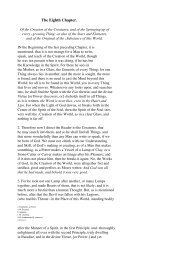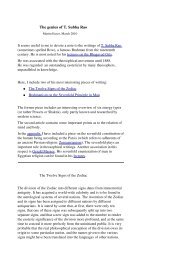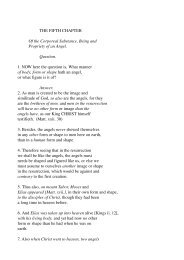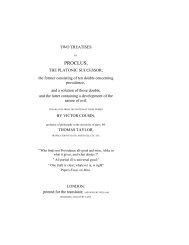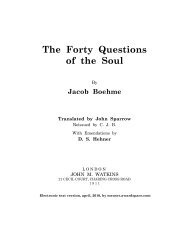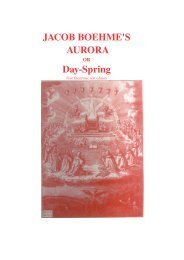Gerald Massey's Lectures - Society in evolution - Awardspace
Gerald Massey's Lectures - Society in evolution - Awardspace
Gerald Massey's Lectures - Society in evolution - Awardspace
Create successful ePaper yourself
Turn your PDF publications into a flip-book with our unique Google optimized e-Paper software.
hemisphere of the superior signs. The "beg<strong>in</strong>n<strong>in</strong>g of his signs," by which Jesus<br />
"manifested his glory," was the turn<strong>in</strong>g of water <strong>in</strong>to w<strong>in</strong>e. The sixth, and last, of these,<br />
was the rais<strong>in</strong>g of Lazarus, which corresponds exactly with the ris<strong>in</strong>g of the Mummyconstellation<br />
(Sahu) of Orion, which ascended as the star of the Resurrection, when the<br />
solar god returned from the dark hemisphere of the under-world, or the sun re-entered the<br />
sign of the Bull at the vernal equ<strong>in</strong>ox. The source of all is the identifiable astronomical<br />
allegory <strong>in</strong> the Soli-Lunar phase, but the fable followed <strong>in</strong> the Gospel is Egyptian, not<br />
Buddhist. The Christ is one with Horus as Lord of the Lunar light, who manifested the<br />
glory (or the Six Glories) of his father, <strong>in</strong> the six upper signs, as his only-begotten Son.<br />
The claim now made is that the common Mythos determ<strong>in</strong>ed the number of the six<br />
Glories, or six Miracles, and the history was moulded accord<strong>in</strong>gly.<br />
I also th<strong>in</strong>k that Jesus--or Joshua-ben-Pandira--was an Essene. That is, he was a Nazarite,<br />
and the Nazarites were one with the Essenes. And these, for example, are amongst the<br />
"say<strong>in</strong>gs" <strong>in</strong> the Book of the Nazarenes. "Blessed are the peacemakers, the just, and<br />
'faithful.'" "Feed the hungry; give dr<strong>in</strong>k to the thirsty; clothe the naked." "When thou<br />
makest a gift, seek no witness whereof, to mar thy bounty. Let thy right hand be ignorant<br />
of the gifts of thy left." Such were common to all the Gnostic Scriptures, go<strong>in</strong>g back to<br />
the Egyptian. This is a Nazarene say<strong>in</strong>g from the Book of Adam:--"No poor sculpture of<br />
earth has fashioned his throne. The palace of the K<strong>in</strong>g was not built up by earthly<br />
masons." And this is from an Egyptian hymn:--"He is not graven <strong>in</strong> marble, nor adored <strong>in</strong><br />
sanctuaries. There is no build<strong>in</strong>g that can conta<strong>in</strong> him." In the ancient Egyptian "Maxims<br />
of Ani" we read:--"The sanctuary of God abhors noisy demonstrations. Pray humbly with<br />
a lov<strong>in</strong>g heart, all the words of which are uttered <strong>in</strong> secret. He will listen to thy words; He<br />
will accept thy offer<strong>in</strong>gs. Exaggerate not the liturgical prescriptions; it is forbidden to<br />
offer more than is prescribed. Thou shalt make adorations <strong>in</strong> his name." These conta<strong>in</strong> the<br />
essence of the early verses <strong>in</strong> the 6th chapter of Matthew, where the <strong>in</strong>junctions given<br />
are:--"Sound not a trumpet before thee, etc. Pray <strong>in</strong> secret to thy Father, which is <strong>in</strong><br />
secret, and he shall recompense thee. And <strong>in</strong> pray<strong>in</strong>g use not va<strong>in</strong> repetitions." Ani<br />
denotes one of the names of Taht who, as Mati = Matthew, wrote down the Say<strong>in</strong>gs of<br />
the Lord, some of which are amongst these Maxims. But, unfortunately, you cannot<br />
prove anyth<strong>in</strong>g, or, still more unfortunately, you can prove anyth<strong>in</strong>g from the Gospels!<br />
You must first catch your Jesus, before you pretend to tell us what he was personally, and<br />
what were his own <strong>in</strong>dividual teach<strong>in</strong>gs. These "say<strong>in</strong>gs of m<strong>in</strong>e," cannot be judged as his<br />
if they were pre-extant, and can be proved to be anyone's say<strong>in</strong>gs, or may be identified as<br />
ancient say<strong>in</strong>gs, whether Buddhist, Nazarene, Apocryphal, or Egyptian. Also, there are<br />
different versions of the same say<strong>in</strong>gs <strong>in</strong> the Gospels! In Matthew, we read: "Blessed are<br />
they that hunger and thirst after righteousness." In Luke it is:--"Blessed are ye that hunger<br />
now." In Matthew:--"Blessed are the poor <strong>in</strong> spirit." In Luke:--"Blessed be ye poor. Woe<br />
unto you that are rich!" Which, then, is the version that is personal to Jesus, the<br />
Nazarene? or where is the sense of claim<strong>in</strong>g that the personal Jesus was an Essene or<br />
Nazarite--one of those who never touched w<strong>in</strong>e, or strong dr<strong>in</strong>k--when one of the <strong>in</strong>spired<br />
writers testifies that he was described as a glutton, and a w<strong>in</strong>e-bibber; and, accord<strong>in</strong>g to<br />
another, his very first miracle was the turn<strong>in</strong>g of water <strong>in</strong>to w<strong>in</strong>e for a marriage feast?<br />
Suppose we admit that you have laid hold of Joshua, the Essene, the Nazarite, the reputed<br />
Great Healer, the Comforter, what can you make of a character so unhuman as this?<br />
A poor Canaanitish woman comes to him from a long distance and beseeches him to cure<br />
her daughter who is grievously obsessed. "Have mercy on me, O Lord," she pleads. But<br />
he answered her not a word. The disciples, brutes as they were, if the scene were real,<br />
besought him to send her away because she cried after them. Jesus answered, and said:--<br />
"I was only sent to the lost sheep of the House of Israel." She worships him, and he calls<br />
her one of the dogs. And it is only her extreme deference that w<strong>in</strong>s a k<strong>in</strong>dly word from<br />
him at last. The Essenes and Gnostics absolutely denied the physical resurrection,



